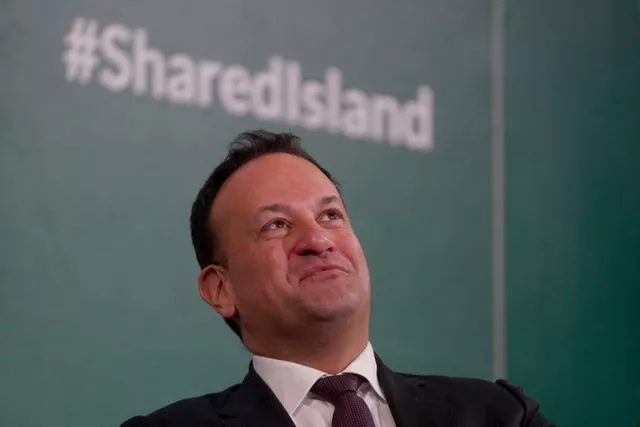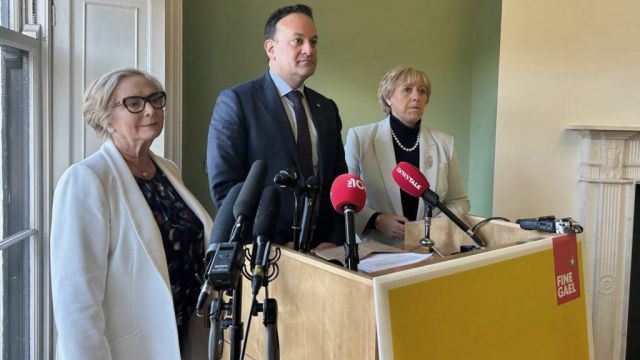Taoiseach Leo Varadkar has warned there will be people attempting to use upcoming referendum's on the rights of families as “red herrings” to mislead voters.
Two referendum's are to be held on March 8th to amend Ireland’s Constitution.
The first plebiscite is on whether the Constitution should be changed to extend the definition of family beyond only those based on marriage to include “durable” relationships.
Vote Yes on March 8th:
✅A more inclusive concept of Family
✅Remove outdated language re a woman’s life within the home
✅Recognise the care & support family members provide to each other
✅State shall strive to support family carehttps://t.co/jfIV46peFZ pic.twitter.com/XBtkVUTfKK— Fine Gael (@FineGael) February 12, 2024
Advertisement
The second is on whether to delete a reference to the role and duties of women in the home and replace it with a new article placing an obligation on the State “to strive to support” the provision of care by families.
Launching Fine Gael’s campaign in support of a yes vote for both changes, Mr Varadkar said there were always “red herrings” in every referendum campaign.
Speaking in Dublin on Monday, he said: “There are going to be people who try to make the referendum about something that it is not actually about.”
Anti-migrant groups have said the proposed changes redefining the rights for family could lead to higher immigration due to increased reunification of asylum seekers’ spouses and relatives.

But Mr Varadkar said immigration law already provided for reunification and added that State law allowed for circumstances where non-national spouses of Irish citizens could be deported.
The Taoiseach told the launch event that one million people would benefit from a “protective shield” of the recognition of their family through the proposed changes to the Constitution.
“We can all think of everyday examples of people that we know; a single mother or a single father raising a family; guardians – perhaps a sister or brother – that has taken on rearing their nieces and nephews when their brother or sister passed on; grandparents bringing up kids because the birth parents aren’t able to for one reason or another,” he said.
“These are everyday examples. We estimate about a million people form these families and yet our Constitution says that their families are not real.”
On the referendum about care, Mr Varadkar said the wording would place an obligation on the State to “strive” to support families providing care.

He said this meant the State would have to “work vigorously” to improve things for family carers.
Asked why the Government had chosen to add the word “strive” rather than proposed a constitutional change to impose an obligation to directly support the provision of care, Mr Varadkar said there was a need to be careful that the wording was not “too strong”.
“If you put in language that is obligatory, for example, it takes decisions away from the Oireachtas – the people that are elected by the public to make decisions – for example, on how money is allocated and potentially puts it in the hands of the courts and judges that are not elected,” he said.
“Anytime we’re making a budget, we have to make difficult choices. And take, for example, social welfare – we’ve to make choices between pensioners and sometimes between carers and sometimes between people that have a lone-parent family and other groups.
“Those are choices that should be made, in our view, by the Oireachtas and the elected members of the people.”
He added: “This does put an additional obligation on the State to strive to support family carers but it doesn’t make it so strong that it might be at the expense of other groups that aren’t listed.”
Elsewhere, Minister for Children Roderic O’Gorman said the proposed wording would place a mandatory obligation on the State to recognise a carer’s role.
“If you pull ‘shall’ into a piece of legislation that’s a clear direction to the government to do something,” the Green minister added.
“The alternative is ‘may’, where you’re giving the government some flexibility. But we placed ‘shall’ in there because it is a clear direction to State that it must continue to do more, it must continue to increase the level of support it gives to family care that will have an impact in Cabinet discussions, in budgetary negotiations, but it will also – as with the article on the family – it will also be ultimately interpreted by the courts and the courts will ultimately say if the State has done enough in terms of meeting that new obligation.”
Mr O’Gorman said a “durable” relationship was one that was stable and committed.
“Durable relationship is a relationship of strength, a relationship of stability, a relationship of commitment, and it’s a relationship that fits in with the wider description of the family in Article 41, something that’s the fundamental unit group of society,” he said.
Mr O’Gorman also said that while the courts would have a role in interpreting the meaning of the Constitution, the Government was “very clear” that it would include one-parent families and cohabiting couples and any children they might have.
He ruled out it including three adults living together who wanted to claim family status.
“That’s not contained within this definition, because that isn’t a fundamental unit group of society,” he said.
Mr Varadkar said it was not the case that every durable relationship could become recognised as a family.
For example, he said nobody would be able to get the courts to define a decades-long-strong business relationship as a family.
He added: “A family must be the natural and primary fundamental unit group of society, that it must be a moral institution, that it must be an institution possessing inalienable and imprescriptible rights, that it must be necessary for the basis of social order and indispensable for the welfare of the State.”
Asked if there was a threshold for how long a relationship must be, Mr Varadkar said durability did not have to be based on a duration.
But he added that existing law outside the Constitution said that cohabiting couples needed to be living together for two years if there was a child involved, or five years if they did not have children before they were recognised under legislation.







